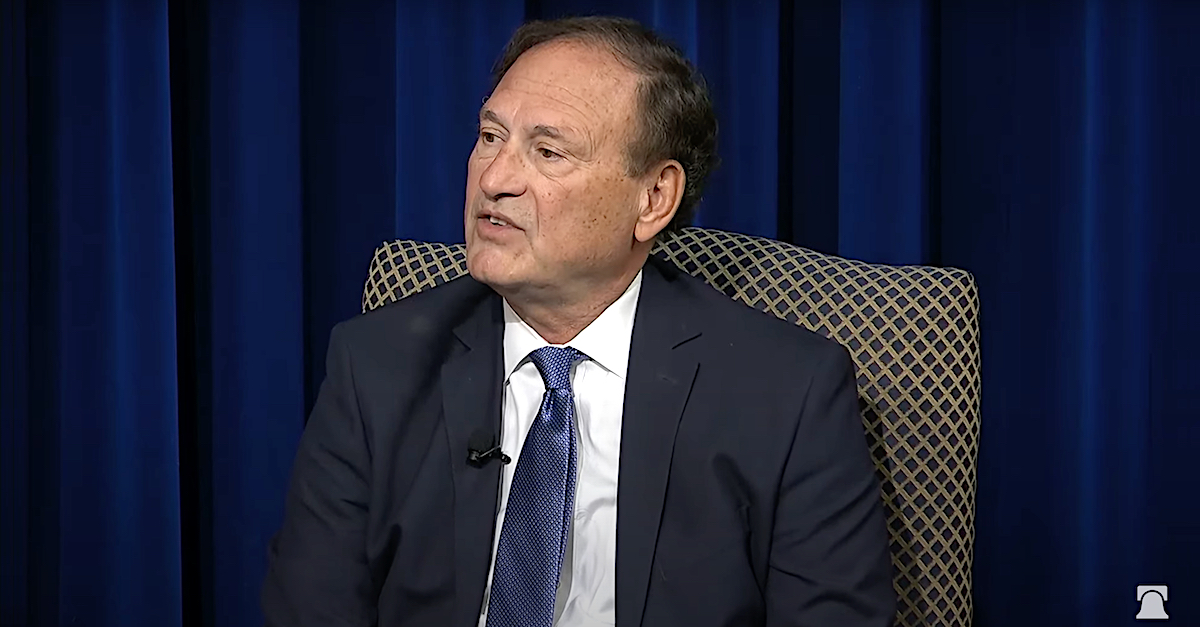
Samuel Alito. (Image via YouTube screengrab/The Heritage Foundation.)
Justice Samuel Alito delivered remarks Tuesday evening in friendly territory — where attendees revere him as the author of the Dobbs decision that overturned Roe v. Wade in what is arguably the crowning achievement of the conservative legal movement.
The Heritage Foundation, a conservative think tank, hosted the 2022 Joseph Story Distinguished Lecture and live-streamed the event on YouTube, as it has in previous years. Past speakers included Alito’s fellow Justices Brett Kavanaugh and Clarence Thomas.
After discussing his roots, his early legal career, and the process of his nomination — which he said involved being told to stand on a certain Washington, D.C. street corner at a certain time on a Saturday morning to wait for a black car to appear, flash its lights, and whisk him to a meeting with the president so as to avoid the press — the conversation turned toward baseball and then eventually toward jurisprudence.
Stare Decisis
The jurist who authored the opinion that famously rubbished Roe ironically extolled the legal theory of “stare decisis,” or honoring past precedent.
He said stare decisis “was an important part of our legal system when the Constitution was adopted” and has been appropriately incorporated into American law. But Alito clarified that it isn’t an “inexorable command.”
“We follow precedent most of the time,” Alito continued when speaking more broadly of judges in general and not necessarily about the Supreme Court. “And what that can mean is that a court will apply a rule that is settled even though the court thinks the rule is probably wrong. The Court has said that it is sometimes better that a rule be decided than that it be decided right. So, that’s stare decisis, an important part of judging.”
Alito then posited that the concept is unique to judging and would be wholly inappropriate in the sciences. As an example, he said it would have been wrong for Einstein to have blindly followed Newton’s theory of gravity without exploring his own theorems.
“No, we don’t want that in any of the natural sciences,” Alito then mused.
He also distinguished legal scholarship from the process of legally judging: in “legal scholarship,” Alito suggested, “there’s no precedent that’s immune from questioning in legal scholarship.”
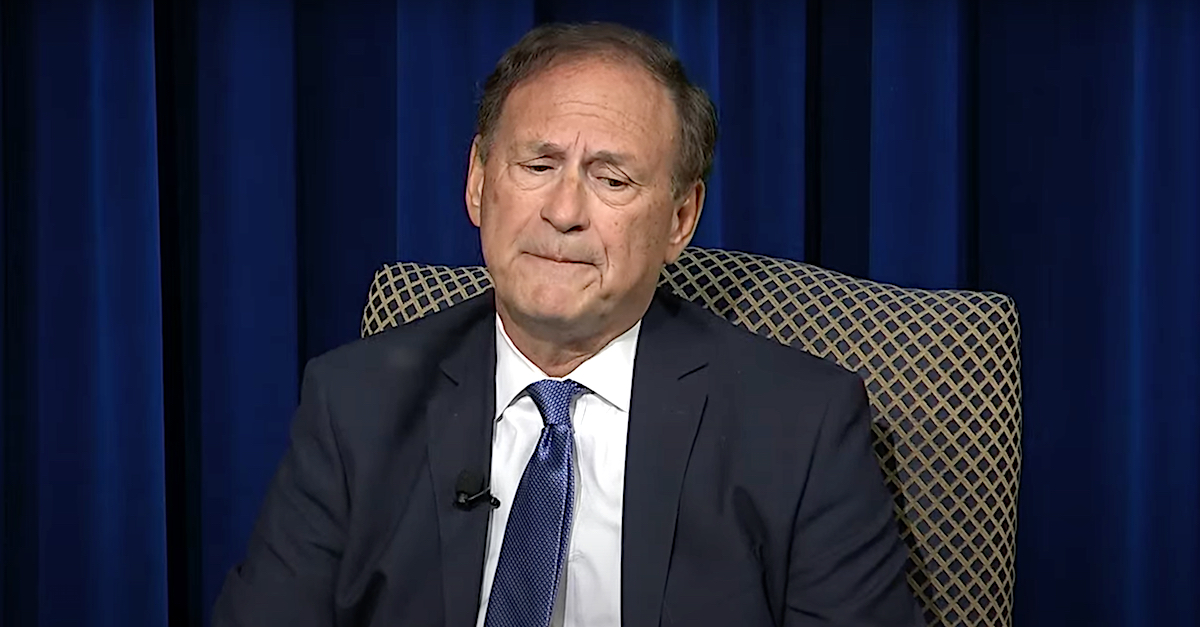
Samuel Alito. (Image via YouTube screengrab/The Heritage Foundation.)
Religion and Society
When asked to discuss the role of religion in society and in American jurisprudence, Alito said the question was “delicate.”
The justice said the religion clauses of the First Amendment allowed people to “practice any religion or no religion” so that a “diverse population” can function “harmoniously and productively.”
He also discussed the historical roots of the notion that American churches were given “autonomy” from the government or government recommendations regarding the selection of clergy — which is a system that had been followed in other parts of the globe, such as Europe.
Free Speech on College Campuses
When asked about the status of free speech on college campuses and in law schools in particular, Alito called the status quo “pretty abysmal,” “disgraceful,” and “really dangerous for our future as a united, democratic country.”
“We depend on freedom of speech,” Alito said. “Colleges and universities should be setting the example, and law schools should be setting the example for the university because our adversary system is based on the principle that the best way to get at the truth is to have a strong presentation of opposing views. So, law schools should be free to speak their minds without worrying about the consequences, and they should have their ideas tested in rational debating.”
The justice said his opinions on the matter were being informed by various reports about controversies on law school campuses and conversations he has had with students. He did not name particular institutions.
He said some institutions — especially law schools — were “not carrying out their responsibility” toward protecting free speech in the manner he envisioned as appropriate and necessary given the societal interests at play.
Alito didn’t name names. Though he did mention his alma mater Yale Law School several times while describing his time there, he didn’t directly indicate that it is embroiled in a controversy over free speech on campus. Some conservative federal judges have said they will stop selecting the elite law school’s students as judicial clerks given their perceptions of what occurs on campus.
When later asked where he prefers to draw the line between “protected and unprotected speech,” Alito said he and his colleagues on the Supreme Court all believed in free speech as a core concept. However, citing Justice Oliver Wendell Holmes Jr., he said the question oftentimes is whether the courts are bold enough to protect “the speech that we fear.”
“Any speech involving public interests, involving politics, government, history, economics, law, science, religion, philosophy, the arts — anything of that level of importance — the general rule has to be the government has to stay out,” he said.
But, Alito added, the First Amendment doesn’t protect “the right of anybody to say anything they want” at any time. The exceptions, he said, were speech involving extortion, threats, fraud, defamation, and — ironically — “shouting fire in a crowded theater.”
The latter is a legally shaky theory given subsequent developments in case law since Justice Holmes penned the famous fire/theater analogy in Schenck v. U.S. (1919). Law&Crime has described the issue ad nauseam because Schenck is no longer good law. It was mostly overturned by Brandenburg v. Ohio (1969), a case involving a Ku Klux Klan leader who spoke at a rally, but the original analogy remains a popular part of the public discourse.
When asked about corporate speech, Alito opined that Citizens United v. FEC (2010) has become a source of considerable and at times unfair criticism — but he agreed that there is much to criticize about the way campaign finance works. He noted all of the major news organizations and entertainment groups are owned by corporations and provide considerable benefits to public debate.
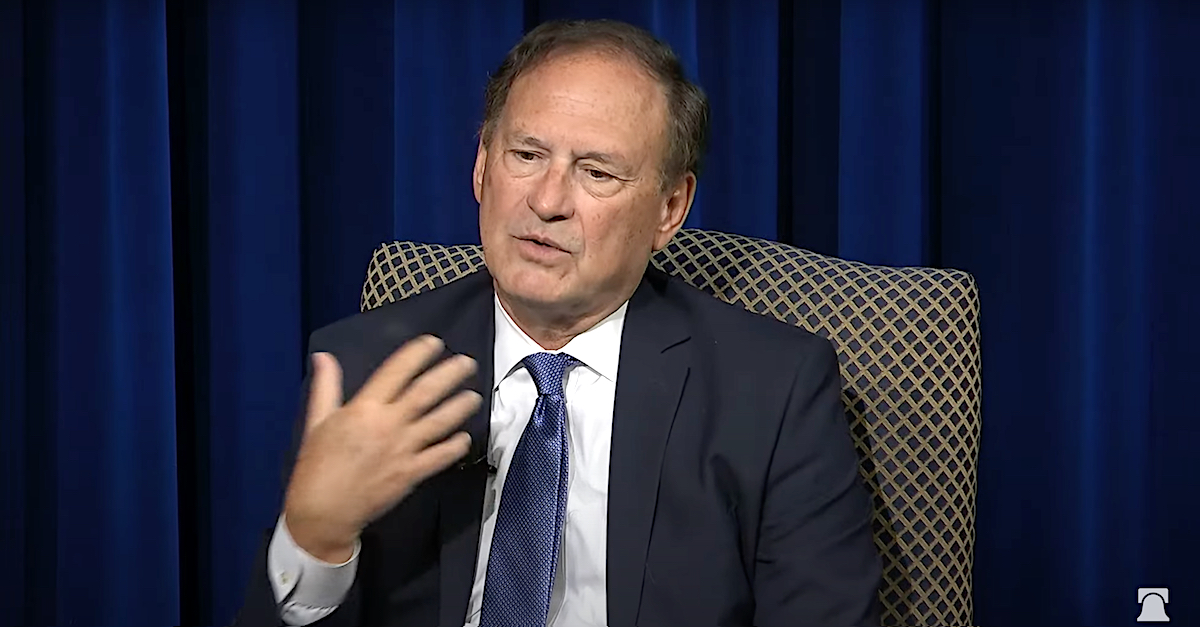
Samuel Alito. (Image via YouTube screengrab/The Heritage Foundation.)
Unpopular Causes
The moderator noted that lawyers frequently are called to represent unpopular causes and included “conservative” causes among those that are frequently attacked. Alito bemoaned the “one-sided approval” of certain causes and said the chastisement of attorneys on the other side of the equation was “to be deplored.”
He then lauded attorneys “dedicated to that principle” of representing unpopular positions — including, apparently, conservative ones — and said “the bar should applaud those attorneys.”
Administrative Law
When asked about administrative law, Alito told the moderator he could be engaged “until midnight” if asked to expound on the topic. But Alito did say that the core argument that he prefers to focus on is the premise that laws are supposed to be passed by both houses of Congress and signed by the president. He seemed to suggest that modern administrative law has run askew of that core principle.
Due Process
When asked about substantive due process, specifically in terms of same-sex marriage and abortion, Alito said the recognition of liberty interests means different things to different people. He specifically noted libertarians and socialists held very different views on the topic. “Structure” and “discipline” was therefore necessary, he suggested.
The justice then returned to the court’s current belief that liberty interests only involve concepts with “deep roots in our history and tradition” — a “standard” he says “keeps this jurisprudence from getting out of control.”
Alito also noted Justice Thomas’ thoughts about whether or not the concept of substantive due process was little more than legal fiction. Thomas has argued that many of the rights enshrined in the substantive due process clause likely should find homes in other portions of the Constitution and that the due process clause involves procedures only.
Public Perception of the Courts
When asked about sentiments that the court is becoming political or is losing the public’s respect, Alito bemoaned attacks on the “character” of the court. He said the public should instead focus on the logic of the decisions being rendered and he welcomed disagreement about the merits of cases. In other words, Alito suggested that rigorous intellectual debate was healthy but cheap shots and character attacks were not.
When asked about suggestions of “court packing” to remedy perceptions of bias, the justice asked a “rhetorical question”: if Congress changed the size of the court to “influence future cases . . . what would that do to the public perception of our independence and our legitimacy?” He said the question was one for citizens to ponder and not for him to answer.
He also suggested that a court that is too large or too small would not work well given his experience as an appellate jurist.
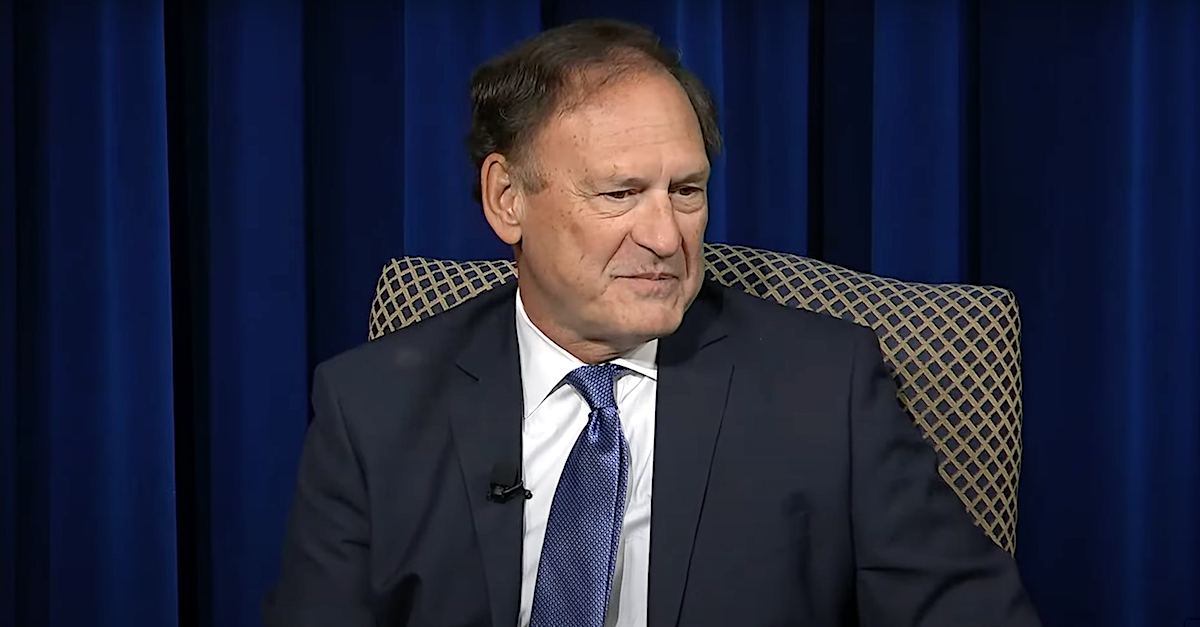
Samuel Alito. (Image via YouTube screengrab/The Heritage Foundation.)
Abortion
When asked about the leak of his Dobbs opinion, Alito responded:
It was a grave betrayal of trust by somebody, and it was a shock because nothing like that had happened in the past. So, it certainly changed the atmosphere at the court for the remainder of last term. The leak also made those of us who were thought to be in the majority and supportive of overruling Roe and Casey targets for assassination because it gave people a rational reason to think they could prevent that from happening by killing one of us. And we know that. A man has been charged with attempting to kill Justice Kavanaugh. It’s a pending case, so I won’t say anything more about that.
Alito then pivoted to look forward toward a “new term” and said he wanted things to get “back to normal to the greatest degree possible” — especially with reference to the court’s operating procedures in light of the Covid-19 pandemic.
But he reiterated that disagreements among the justices are not “personal.” He said he was probably as “guilty” as anyone of injecting strong and “unrestrained” language into his opinions — perhaps to a degree that might unfairly suggest to the public that the justices were at one another’s throats.
The Role of the Courts
Alito eventually responded to a prompt to comment on the role of liberty as something that dwells in the hearts of men and the perceived “fragility” of the Constitution.
“There will be those in government who want to from time to time — want to restrict rights,” Alito supposed. “Federal government, state governments, local governments. And, so, what happens when they try to do that? Who is going to be there to try to stop this from happening? Well, we hope the courts will do that. Most of the time the courts do that.”
“But in the end,” Alito waxed on, “the judiciary is the weakest of the three branches. “If it came down to a bare-knuckle fight between the judiciary and either the executive or congress, there’s no doubt who would lose.”
He also suggested that justices are “human beings” whose thinking are “over time” affected by popular opinion — and only the citizenry can keep its hope for liberty alive in that context.
In Context
In recent months, as Law&Crime has noted, the justices have had a lot to say, whether abroad or at home, at times in response to their critics and even to their Supreme Court colleagues. Many of those statements have focused on political polarization of the country and politicization of the court, as embodied in the aforementioned leak of Alito’s draft opinion overturning Roe and Planned Parenthood v. Casey.
Alito, for his part, joked during a speech in Rome that he “had the honor” of writing “the only Supreme Court decision in the history of that institution that has been lambasted by a whole string of foreign leaders who felt perfectly fine commenting on American law.”
One overarching theme of the speech was the justice’s commentary on religious liberty as “under attack.” Prior Alito speeches included a heavy dose of media criticism for use of terms such as the “shadow docket.”
In that September 2021 speech, nearly a year before he overturned Roe, Alito bristled over the reaction and outcry over the court’s decision not to block S.B. 8, a Texas anti-abortion statute permitting private actors to sue abortion providers.
“It’s perfectly fine; it’s productive for there to be a fair, public debate about those substantive issues. My complaint concerns all the media and political talk about our sinister shadow docket. The truth of the matter is that there was nothing new or shadowy about the procedures we followed in those cases,” Alito said in a representative remark. “It’s hard to see how we could handle most emergency matters any differently, and despite all the recent criticism of the shadow docket, we have not seen many serious proposals setting out significantly different procedures that we could follow.”
Alito criticized the media several times on Tuesday but was more restrained: while he said he was extremely bothered by unethical requests from local journalists for leaks about cases in return for favorable coverage while he was a federal prosecutor, he lauded the benefits of the free press in public debate.
Two years ago, the justice expressed disdain for academia, experts, and Covid-19 restrictions on “individual liberty” in a different speech before the Federalist Society.
“Unfortunately, tolerance for opposing views is now in short supply in many law schools and in the broader academic community,” Alito diagnosed, perhaps to U.S. Circuit Judge James Ho’s satisfaction, what ails academia and the country. “[Recent law school graduates] face harassment and retaliation if they say anything that departs from the law school orthodoxy.”
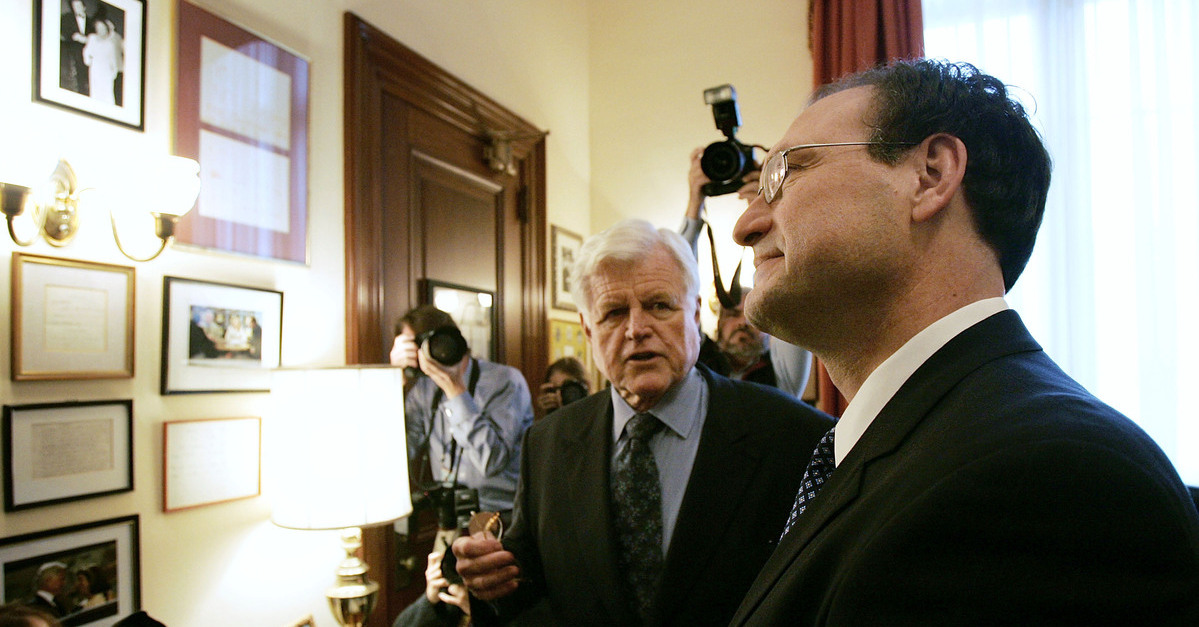
Then-U.S. Supreme Court nominee Samuel A. Alito (right) is shown family photos by U.S. Sen. Ted Kennedy (D-Mass) (center) in Kennedy’s office on Capitol Hill November 15, 2005 in Washington, D.C. (Photo by Win McNamee/Getty Images.)
Earlier on Tuesday, Alito was in the news because of something the late Ted Kennedy wrote in his diary in the 2000s: that then-nominee Alito had assured him Roe v. Wade was “settled,” that he was a “believer in precedents,” and that he had “matured a lot” since he authored an anti-Roe memo while working as a Reagan administration lawyer in the ’80s.
Alito, of course, went on to write the majority opinion upsetting settled law on abortion rights.
The full Tuesday speech is below via an external link to the Heritage Foundation’s YouTube channel.
[Images via Heritage Foundation screengrabs, except as noted.]